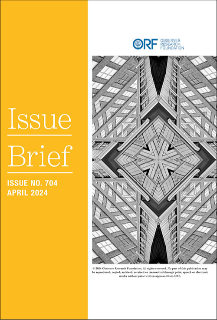Nurturing Cooperation in the Critical Minerals Supply Chains

The world is transitioning into a green industrial revolution, focusing on cleaner technologies for future generations. The demand for critical minerals like graphite, cobalt, lithium, and copper is set to skyrocket due to their essential role in advanced technologies, including clean energy and national defense. Countries with natural reserves, such as Chile, Australia, and China, are poised to lead in this global race for critical minerals.
Source: Link
FAQ: Nurturing Cooperation in the Critical Minerals Supply Chains - Observer Research Foundation
FAQ: Nurturing Cooperation in the Critical Minerals Supply Chains - Observer Research Foundation
Q1: What is the Observer Research Foundation (ORF) and why are they studying critical minerals supply chains?
A1: The Observer Research Foundation is a think tank based in India that conducts multidisciplinary research. They are studying critical minerals supply chains to explore ways of nurturing cooperation among countries and other actors to ensure a stable and secure supply of minerals that are essential for modern technologies and industries.
Q2: Why is cooperation in critical minerals supply chains important?
A2: Cooperation in critical minerals supply chains is crucial because these materials are integral for various technologies such as renewable energy systems, electronics, and defense applications. Collaborative efforts are needed to prevent supply disruptions, improve sustainability, and manage geopolitical risks associated with the scarcity and geographical concentration of these minerals.
Q3: What kind of turmoil has the global order faced in the last decade with respect to critical minerals?
A3: While the Observer Research Foundation paper titled "Nurturing Cooperation in the Critical Minerals Supply Chains" may provide a detailed commentary, it's clear that in the last decade the global order has experienced challenges such as geopolitical conflicts, trade tensions, and national security concerns that have impacted the stability and reliability of critical mineral supply chains.
Q4: How has the United States addressed critical mineral supply chain challenges?
A4: The US Department of Energy released a strategy in January 2021 to support domestic critical mineral and material supply chains. It calls for a coordinated federal approach to address these challenges through research, supporting domestic production, and creating international partnerships.
Q5: What role do critical minerals play in clean energy transitions according to the International Energy Agency (IEA)?
A5: The IEA emphasizes that critical minerals are essential for clean energy transitions as they are the building blocks for technologies like wind turbines, electric vehicles, and solar panels. Establishing governance and resilient global supply chains for these minerals is necessary to ramp up clean energy technologies and to meet climate change mitigation targets.
Q6: Are there any initiatives between the United States and international partners for economic security that include critical minerals?
A6: Yes, as noted in a CSIS analysis from November 2023, there has been an approach to economic security that encompasses collaborative efforts to secure critical supply chains, which include medical supplies, minerals, batteries, and semiconductors. This includes the idea of working with partners to strengthen supply chain resilience.

